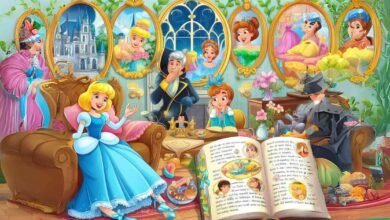The Princess Lacquer [1]
![The Princess Lacquer [1]](https://kidsstory.org/wp-content/uploads/2019/11/the-princess-lacquer-1_5ddb1bbe4e1dc.jpeg.webp)
In a far eastern kingdom, this was how they called their daughter U Tin, a humble craftsman. They named her because there was no one more skilled than herself in the art of lacquering any kind of object.
Everything the young woman recorded on the trays, pots, cups, and boxes her father made seemed to come to life in her hands.
A proud king reigned unopposed in that country.
He had proclaimed himself “Brighter than the sun.” Nothing that happened in his kingdom escaped him, and so the fame of Princess Lacquer came to him.
He sent for one of his ministers and ordered him:
“Go and confirm that this princess is as capable as they say.” If so, pay him to put his talent solely to my service.
The minister received a purse full of money and set off on his way. He rode a whole day on his horse’s back. Far beyond the course of the river, he finally came to a village where U Tin and his daughter lived, and soon found the path that led to his workshop.
The minister asked to see the work of the Princess and found it truly admirable.
“From now on you will serve only our resplendent sovereign.”
U Tin timidly interposed:
“Sir, my daughter can never satisfy the refined taste of someone so powerful.” The lacquers we make are meant for humble people, peasants, fishermen…
The Princess, in turn, added:
“Our king is said to love objects covered with gold leaf and precious stones.” We will need to find a way to buy all of this so that the lacquer will suit you.
The minister raised an eyebrow:
– Are you asking me for money? Who told you about money? Get ready and do wonders! I will be back soon to collect your work.
He left the workshop, jumped to the horse’s back, and galloped off.
Smile with contentment. The purse with the money remained in his pocket and would be there.
In order to satisfy the king in spite of everything, U Tin plunged himself into the thick woods where large, beautiful trees grew with the best of the resins, which give the most desired shade, a deep and perfect black.
Then, with this resin, the Princess crumpled and shaped a paste as dark and silky as a crow’s wing. She did not show her works to anyone. When the girl finished a piece, she kept it in the basement, protected from the sun and prying eyes. Not even U Tin entered this place.
Three months passed and the minister returned to take possession of the objects intended for the king.
Princess Lacquer had placed them in large, tightly closed baskets.
The minister had them loaded onto a wagon that returned to the capital under escort.
“Brighter than the sun” impatiently took a lacquered piece as soon as the first basket opened.
He shouted in surprise:
– As? How did she dare?
He bent over the other pieces to examine them.
The scenes recorded by Princess Lacquer all had the same reason: the suffering of the people of Burma, crushed under the law of a tyrant.
The king was terribly furious. His minister felt a trickle of sweat trickle down his back. If you were held responsible for the offense your head would pop out.
“Brighter than the sun” said in a threatening voice:
– Take me to this insolent one! It should be punished right there!
A few moments later the king sat in his glittering coach and was accompanied by dozens and dozens of armed men.
The minister was making his way in a hurry. Fear gave him wings.
The soldiers entered U Tin’s workshop. They dragged the old man and his daughter abroad, and hurled them at the king’s feet.
“Brighter than the sun” leaned over Princess Lacquer and barked in her face:
– Your images are but lies!
“Majesty, there is nothing in these lacquered pieces that I have not seen with my own eyes.
“Well, your eyes will be torn out!” Ordered the king.
– Forgive my daughter! Begged U Tin. I am the one to be punished.
The neighbors had gathered in droves around the workshop. “Brighter than the sun,” he said in a powerful voice, so as to be well heard:
– Is right! This old man is equally guilty. You will be cast out of my kingdom. As for her daughter, who dared to usurp the title of Princess, I will pardon her for the eyes … but they should never see any light again.
The king left the place. Some soldiers stayed there for the purpose of building a prison that was not long in the center of the village.
It had no door. They left only a tiny trapdoor to feed and water, but this trapdoor was so constructed that it would not let light into the prison.
The soldiers left a gap in one wall through which they pushed their prisoner, then closed it with bricks and mortar.
Princess Lacquer was engulfed in complete darkness.
He scratched the walls with his nails for a long while until he was in tears. It had been removed from the world of the living.
A trickle of cold air dried the tears of Princess Lacquer. Near his face was a crack. There was no light, but it allowed to hear the faint echoes from outside: children’s laughter, the peasants’ song, the call of the boatmen…
If Princess Lacquer could hear the village people, no doubt they could in turn hear their words. He moved as close as he could to the crevice and began to speak. What prevented her from showing with her works would testify to her voice.
From that moment on, he no longer listens to Princess Lac or Day.
In prison, he forgot the passage of time while restlessly recounting what his eyes had witnessed. I was not hungry or thirsty. It seemed to lighten with each word he spoke.
When Princess Lacquer finally felt as light as a light breath, as a sigh, she knew that no wall could hold her any longer.
That would eventually be free.
“Brighter than the sun” had not left his palace since he had arrested Princess Lacquer. He feared a revolt from his people. Within his royal quarters he no longer felt safe. He distrusted his soldiers, his ministers, and even his own family.
In the dark hours of the night, “Brighter than the sun” received countless spies to pay to be informed of everything that happened.
One afternoon, one of them brought her an object like one that Princess Lac had the courage to send to the palace.
– Where did you get it? Speaks!
“Majesty, these lacquered pieces are everywhere,” the spy confessed.
“Brighter than the sun” sent for his minister.
“Why didn’t you do anything to prevent this new affront?”
“But I don’t know anything, Majesty!”
“Then I’ll have to deal with the fake princess myself!”
The minister hurried to follow “Brighter than the sun.”
“You do not come,” the king said to him. “A man whose head goes round cannot be of use to me.”
In the riverside village, the workshops were already countless. The artisans were fast at work, making trays, pots, cups and boxes. In all of them were the same scenes that Princess Lacquer had played.
There were tens, hundreds, thousands; no one could ever prevent so many lacquered pieces from circulating around the kingdom.
– How is it possible? Shouted the king. “They let the false princess out!”
He headed for the prison. It was still in the same place it had been built and without any door to exit.
With violent hammer blows they made a large hole in the prison wall: there was no sign of Princess Lacquer inside. Near the trapdoor, “Brighter than the Sun” saw a lot of bowls and plates.
No one seemed to have touched the water or the food they contained.
The king felt himself going mad:
– You can’t have escaped! … Find her, soldiers, find her!
While his men searched the village, “Brighter than the sun” entered a workshop. He crushed the lacquered pieces in his fury. Suddenly he screamed like a savage and jumped as if something had been nailed to his heel: a face was multiplying in each of the pieces scattered on the floor.
Wherever “Brighter than the Sun” laid its gaze, the smile of Princess Lacquer appeared. He left the workshop and started running, gesturing and trying to escape. But that face continued to multiply before his eyes, in the leaves of the trees, in the dust of the path, in the bright water of the ferns.
Time is like a river: it runs without stopping.
How many days, weeks, months have passed since Princess Lacquer disappeared? Lost account. Artisans continue to work just as Princess Lacquer taught them to do, and the objects they make always show the life of the people as their eyes can see it in all truth.
None of these men and women fear yet the wrath of the king. “Brighter than the sun” had long since thrown itself into the river to escape the face of Princess Lacquer, who was constantly tormenting him.
The village has regained its usual look and there is no prison anymore. Everywhere you hear the laughter of children, the singing of peasants, the call of boatmen.
On full moon nights, it is said that in the starry sky above the golden pagodas… a luminous silhouette glides like a cloud: Princess Lacquer. Françoise Malaval The Princess Lacquer Cánoves (Barcelona): International Amnesty: Proteus, 2008 Translated and Adapted [1] An illustrated book by in favor of freedom of expression, in honor of the 1991 Nobel Peace Prize laureate Daw Aung San Suu Kyi (1945-), daughter of General Aung San, who negotiated in 1948 the independence of Burma. Suu Kyi is a political woman from Burma, leader of the non-violent opposition to the country’s military dictatorship, Nobel Peace Prize laureate in 1991. Despite successive imprisonment, she persists in her struggle for the defense of human rights and the freedom of the people of Burma. Burma.


